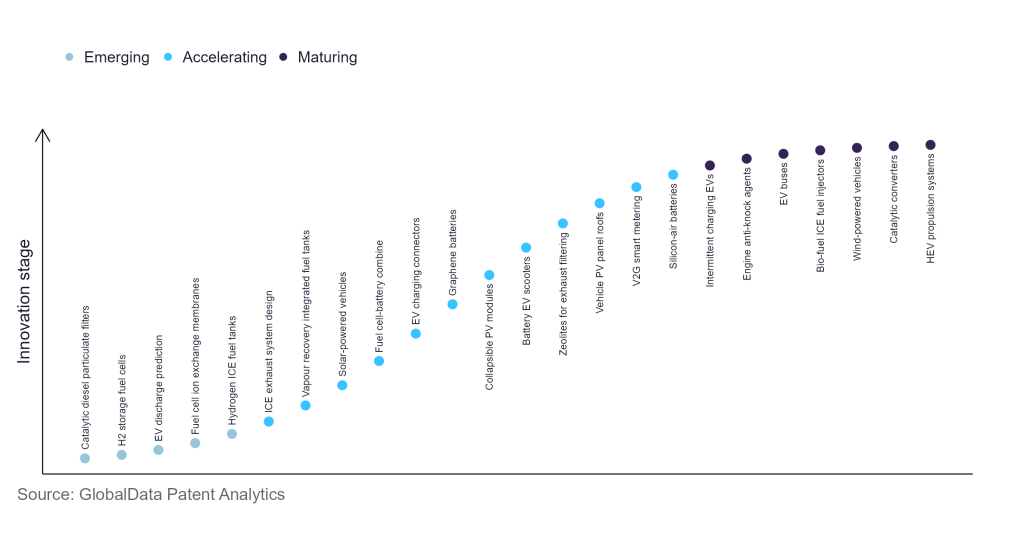The automotive industry continues to be a hotbed of innovation, with activity driven by the need to reduce vehicle emissions by environment-conscious consumers and stringent government regulations, and growing importance of technologies such as solar photovoltaic cells and passive solar technology. In the last three years alone, there have been over 1.2 million patents filed and granted in the automotive industry, according to GlobalData’s report on Environmental sustainability in Automotive: Solar-powered vehicles.
However, not all innovations are equal and nor do they follow a constant upward trend. Instead, their evolution takes the form of an S-shaped curve that reflects their typical lifecycle from early emergence to accelerating adoption, before finally stabilising and reaching maturity.
Identifying where a particular innovation is on this journey, especially those that are in the emerging and accelerating stages, is essential for understanding their current level of adoption and the likely future trajectory and impact they will have.
290+ innovations will shape the automotive industry
According to GlobalData’s Technology Foresights, which plots the S-curve for the automotive industry using innovation intensity models built on over 619,000 patents, there are 290+ innovation areas that will shape the future of the industry.
Within the emerging innovation stage, EV discharge prediction, fuel cell ion exchange membranes, and hydrogen ICE fuel tanks are disruptive technologies that are in the early stages of application and should be tracked closely. V2G smart metering, silicon-air batteries, and zeolites for exhaust filtering are some of the accelerating innovation areas, where adoption has been steadily increasing. Among maturing innovation areas are HEV propulsion systems and wind-powered vehicles, which are now well established in the industry.
Innovation S-curve for environmental sustainability in the automotive industry

Solar-powered vehicles is a key innovation area in environmental sustainability
Solar vehicles are electric vehicles that utilise self-contained solar cells to power themselves fully or partially from sunlight. These vehicles normally contain a rechargeable battery to aid in regulating and storing the energy from the solar cells.
GlobalData’s analysis also uncovers the companies at the forefront of each innovation area and assesses the potential reach and impact of their patenting activity across different applications and geographies. According to GlobalData, there are 100+ companies, spanning technology vendors, established automotive companies, and up-and-coming start-ups engaged in the development and application of solar-powered vehicles.
Key players in solar-powered vehicles – a disruptive innovation in the automotive industry
‘Application diversity’ measures the number of different applications identified for each relevant patent and broadly splits companies into either ‘niche’ or ‘diversified’ innovators.
‘Geographic reach’ refers to the number of different countries each relevant patent is registered in and reflects the breadth of geographic application intended, ranging from ‘global’ to ‘local’.
Patent volumes related to solar-powered vehicles
Source: GlobalData Patent Analytics
Toyota is a key player in the solar-powered vehicles innovation area. The 2023 Toyota Prius has optional solar-powered roof panels. In addition to charging via the engine or a charging station, the cells can also be charged via optional solar cells on the roof. The solar roof can generate electricity equivalent to 1,800km of driving distance per year. Hyundai, Ford, Husqvarna and Panasonic are some of the other key players.
To further understand how environmental sustainability is disrupting the automotive industry, access GlobalData’s latest thematic research report on Automotive.









